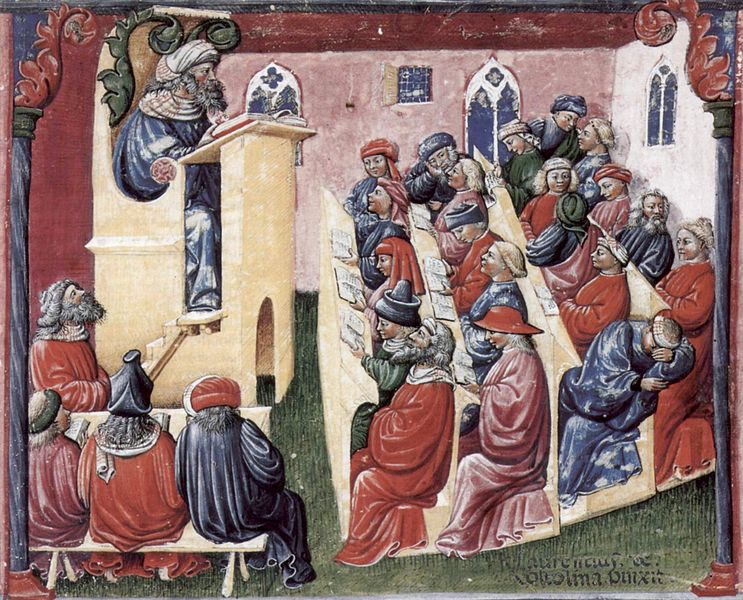
10 Dic The Intercultural Roots Early Scholasticism
Los días 23 y 24 de enero de 2020 se va a celebrar en el Goodenough College (Londres) la conferencia «The Intercultural Roots Early Scholasticism: Greek, Hebrew, Arabic, Latin”.
Estas jornadas pretenden comprender el proceso de confluencia entre las fuentes griegas, hebreas y árabes que influyeron en la interpretación escolástica de Aristóteles, entre otros autores. Participarán en ellas los siguientes profesores e investigadores:
- Amos Bertolacci (Lucca)
- Charles Burnett (The Warburg Institute)
- Alexander Fidora (ICREA—Barcelona)/ Nicola Polloni (Berlin)
- Dag Hasse (Würzburg)
- John Marenbon (Trinity College, Cambridge)
- Lydia Schumacher (King’s College London)
- Lesley Smith (Oxford)
- Anna-Katharina Strohschneider (King’s College London)
- Faith Wallis (McGill)
Quienes deseen acudir, deben registrarse previamente aquí antes del 9 de enero (es necesario hacer una inscripción para cada día).
Información original
The Intercultural Roots Early Scholasticism
The late twelfth and early thirteenth centuries represent a dynamic period in Western intellectual history. These were years, before Aristotle’s works were fully digested, during which philosophical works written in Greek, Hebrew, and Arabic were becoming available in Latin for the first time, skewing understanding of Aristotle considerably and introducing themes into Latin thought in their own right. The proposed workshop seeks to better understand the phenomenon of the confluence of Greek, Hebrew, and Arabic sources that influenced early scholastic interpretations of Aristotle as well as Latin authorities like Augustine by investigating more closely those sources and the phenomenon of their transmission into Latin. In this connection, papers will be offered on various aspects of the Greek/Arabic/Hebrew tradition that had an influence on early scholastic thought particularly in the late twelfth and first half of the thirteenth century.
Speakers
- Amos Bertolacci (Lucca)
- Charles Burnett (The Warburg Institute)
- Alexander Fidora (ICREA—Barcelona)/ Nicola Polloni (Berlin)
- Dag Hasse (Würzburg)
- John Marenbon (Trinity College, Cambridge)
- Lydia Schumacher (King’s College London)
- Lesley Smith (Oxford)
- Anna-Katharina Strohschneider (King’s College London)
- Faith Wallis (McGill)
Provisional Schedule
Thursday 23 January
10:00-10:15 Welcome and Introduction
10:15-11:15 Paper 1: Charles Burnett (The Warburg Institute)
‘Arabic and Latin Summae’
11:15-11:45 Tea break
11:45-12:45 Paper 2: Dag Hasse (Würzburg)
Translating Double Intentionality from Arabic into Latin
1:00-2:00 Lunch
2:00-3:00 Paper 3: Lesley Smith (Oxford)
The Summa Halensis, William of Auvergne, Maimonides, and Avicenna
3:15-4:15 Paper 4: Faith Wallis (McGill)
A Twelfth Century Physician Reflects on the Soul, the Spirits, and the Problems of Free Will
4:15-4:45 Tea break
4:45-5:45 Paper 5: José Meirinhos (Porto)
Intellectus agens est triplex: Jean of la Rochelle and Petrus Hispanus Portugalensis
6:00-7:00 Opening Reception
Friday 24 January
10:00-10:15 Welcome and Introduction
10:15-11:15 Paper 6: Amos Bertolacci (Lucca)
Averroist or Anti-Averroist? On Albert the Great’s Attitude towards. Averroes in the Commentary on the Metaphysics
11:15-11:45 Tea break
11:45-12:45 Paper 7: Alexander Fidora (ICREA—Barcelona)/Nicola Polloni (Berlin)
Dominicus Gundissalinus and the Reception of Arabic Philosophy in the 13th Century
1:00-2:00 Lunch
2:00-3:00 Paper 8: John Marenbon (Cambridge)
3:15-4:15 Paper 9: Anna-Katharina Strohschneider (King’s College London)
4:15-4:45 Tea break
4:45-5:45 Paper 10: Lydia Schumacher (King’s College London)
Early Franciscan Psychology: A Milestone in the Reception of Islamic and Jewish Philosophy



No Comments